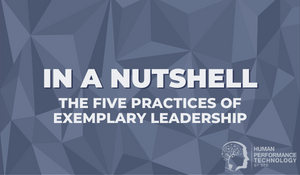3 Things Managers Should Know About Leadership

This article looks at 3 of the most important leadership "fundamentals" that all managers should know, according to leadership experts.

1) Your Title Doesn’t Make You a Leader
Individualism is about you. Management is about the business. Leadership is about others. In 1977 Robert K. Greenleaf published Servant Leadership, which became one of the most influential leadership texts ever written on the subject and its ideas have shaped subsequent generations of leadership thinkers. Greenleaf contrasted the servant leader, who is drawn to serve and help others grow, from the individual leader, who is drawn to power and prestige for personal gain. In a similar vein, modern experts tend to avoid viewing leadership as an entitlement, a position, or a title; rather, leadership is best understood as an opportunity, a decision, and a privilege to impact the lives of others.
- Read more about Servant Leadership
2) The Most Charismatic Leaders Aren't the Best Leaders
When people think about leadership they often think of polished public speakers with magnetic personalities. Humility almost seems like an impediment to success, since the humble leader may shun the spotlight and go completely unnoticed. Arguably the most significant finding from Jim Collins’ landmark business book Good to Great was the concept he called “Level 5” leadership. Collins found that the variable associated with charisma in CEOs was actually negatively correlated with companies making the leap from good to great (defined by long-term stock performance). Charismatic leaders’ effectiveness was capped at “Level 4” (good but not great). The highest level of leadership effectiveness (“Level 5”) was defined as “a paradoxical blend of personal humility and professional will.” There is recent research suggesting that charisma is one of those leadership traits where the sweet spot is having a medium amount, and high levels are associated with more negative effects.
- Read more about Level 5 Leadership

3) The #1 Habit of Great Managers According to Google
In 2009 Google’s HR team went to considerable lengths to determine the traits of a great manager within the Googleplex. The resulting manifesto was entitled Eight Habits Of Highly Effective Google Managers. Having “key technical skills” was ranked #8, while the number #1 habit was “be a good coach” which included: “Provide specific, constructive feedback, balancing negative and positive.”
Below are some examples to quickly illustrate the different aspects of constructive feedback.
Saying…
- “I know a great keyboard shortcut to save time” instead of “that’s the long way; do it my way.”
- “The main drawback I see with that idea is…” instead of “Tom, your idea will never work.”
- “Let me show you a website with the look and feel I want you to use as your blueprint” instead of “you didn’t listen; that’s not what I asked you to build.”
Constructive feedback is considerate, task specific, and aims to shift focus away from the individual.
- Read more about Google’s Project Oxygen
Topics:
Leadership
Theo Winter
Client Services Manager, Writer & Researcher. Theo is one of the youngest professionals in the world to earn an accreditation in TTI Success Insight's suite of psychometric assessments. For more than a decade, he worked with hundreds of HR, L&D and OD professionals and consultants to improve engagement, performance and emotional intelligence of leaders and their teams. He authored the book "40 Must-Know Business Models for People Leaders."




We Would Like to Hear From You (0 Comments)